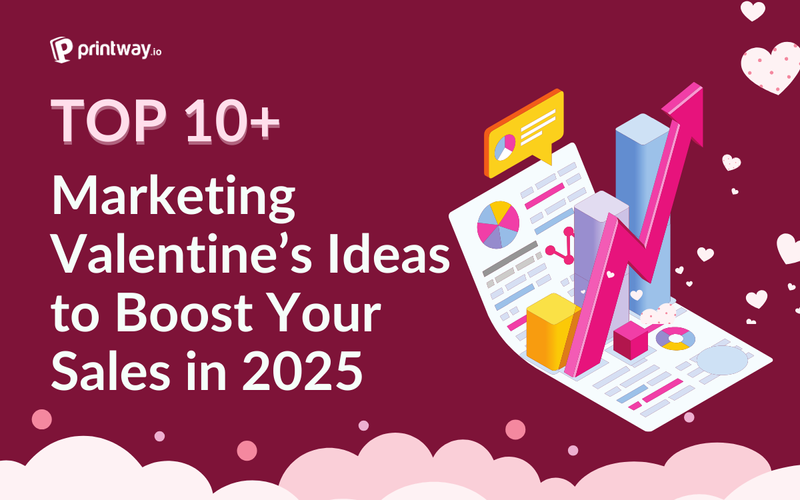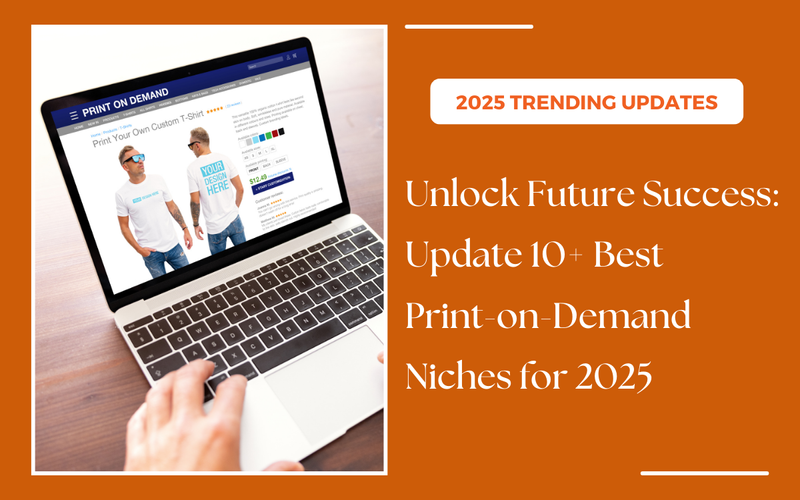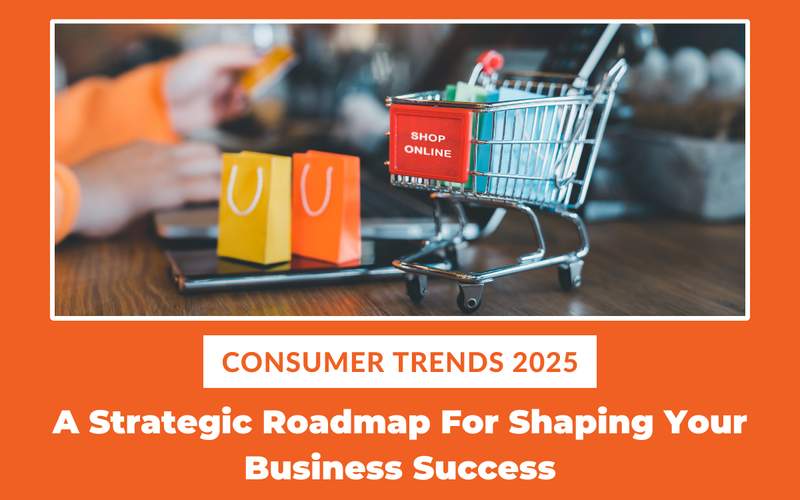Top 7 Best Platforms For Print-on-demand Products In 2025
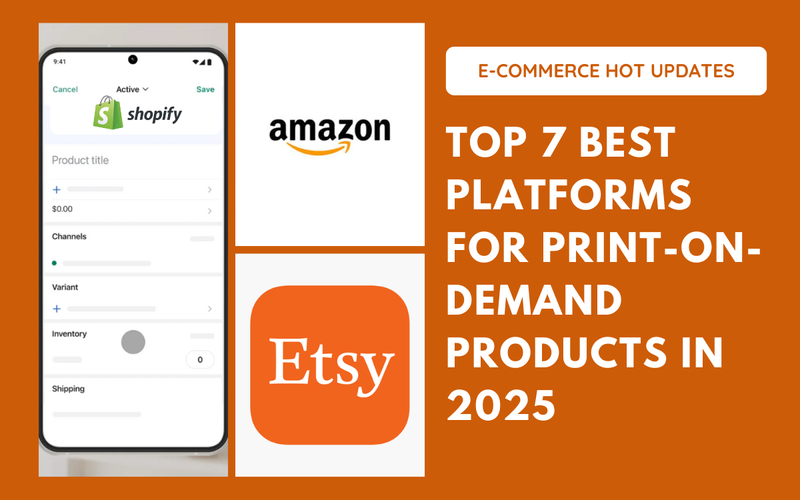
Introduction
Selling print-on-demand products is estimated as a great idea to make money online because sellers don't need to worry about manufacturing, warehouses, or in-stocks. All you need to take care of is defining target audiences, making creative designs, and promoting your products.
But...where is the best place to sell your print-on-demand products? Among many choices like Etsy, Amazon, and Redbubble, you will be confused about how to choose the best platform for print-on-demand products.
If you haven't found the most suitable one for your business, the article today is made for you. You'll understand the main standards for choosing the best e-commerce marketplaces for your store. And with the most popular platforms, you'll get its overview, pros and cons when you promote your items on them.
Let's discover and find out the best one for you now!
Key Factors For Choosing Suitable Platforms To Sell Print-on-demand Products
In order to choose the suitable platforms, you need to understand the common standards to choose suitable platforms for selling print-on-demand products.
1- Target Audience
Firstly, you need to ask yourself who your target customers are. Choosing a suitable platform can help you to connect with customers who love your type of product. For example, Etsy is a great fit for artistic and handmade designs, while Amazon attracts a broader audience seeking convenience and variety.
2- Ease of Use
With e-commerce sellers, especially small businesses, intuitive interfaces, and easy listing processes can help save you time and effort considerably. Not only a simple place to promote products, the ideal platform needs to help you manage stores, and have an overview of analytics of orders, revenue, etc.
3- Marketing and SEO
Along with defining target audiences and user-friendly, an ideal platform to sell needs to help merchants easily conduct marketing strategies and SEO to optimize their product listings. With some platforms owning strong marketing support, you will have the ideal data to track performance, which can be the stable base to refine your strategies and captivate more customers.
4- Fee and Profit Margins
Every platform comes with costs, such as listing fees, transaction fees, or subscription charges. You need to understand what the platform provides and what your business needs to choose the suitable one that ensures your profits. Balancing costs and potential sales is critical for keeping and developing your business long-term.
5- Shipping and Fulfillment
Last but not least, the seamless integration between the platform and your POD provider is essential for a great platform. Choosing a platform where you can easily integrate with your print-on-demand fulfillment service as well as streamline order processing and shipping is quite important with POD stores. The smooth fulfillment processes not only save you time but also keep your customers happy with fast, reliable delivery.
Top Platforms for Selling Print-on-Demand Products
1- Etsy
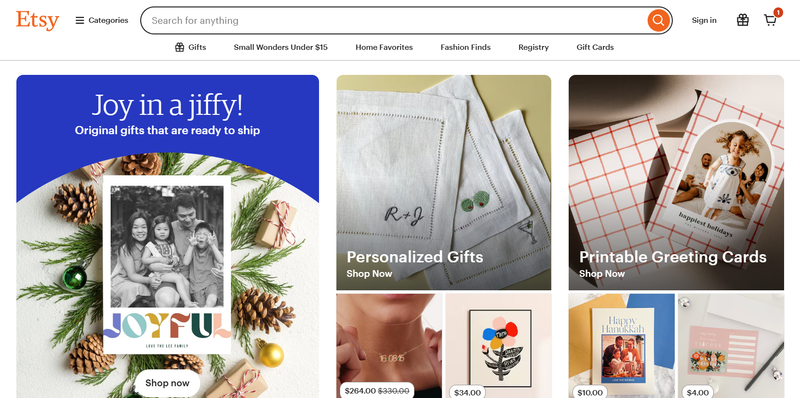
Etsy is a globally recognized marketplace tailored for handmade, vintage, and custom products. With its strong focus on creativity and personalization, it’s one of the best print-on-demand marketplaces for sellers offering unique and artistic designs like personalized mugs, wall art, or custom apparel. Etsy attracts a highly engaged audience that actively seeks one-of-a-kind products.
Pros:
- The simple setup process for opening a shop and listing products which is quite suitable for small businesses or POD beginners.
- Built for customers who love one-of-a-kind products. That's why, Etsy is quite suitable for POD stores
- Strong SEO tools to optimize product listing with keywords
Cons:
- High competition because many stores with popular niches on Etsy
- Fees and costs of $0.20 per item. You can learn more about the listing fee here
- Limited options to customize the shop's appearance
2- Amazon
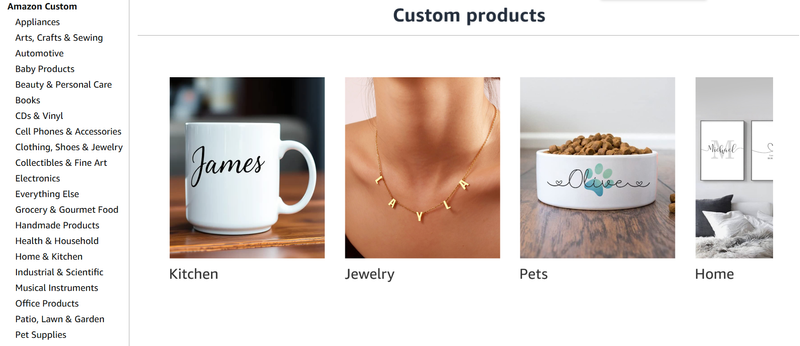
Amazon is known as one of the largest e-commerce platforms in the world. Don't think that this platform is only suitable for merchants who provide mass-produced items. Recently, with Amazon Custom, this marketplace has also been evaluated as the best print-on-demand platform.
Pros:
- Massive customer base: sellers will have chances to access millions of active buyers all over the world, which is a great chance of making sales.
- Built-in trust and credibility. Compared with other platforms, you can easily attract customers by utilizing Amazon's reputation
- Advanced Fulfillment Options: With services like Fulfillment by Amazon, sellers can easily streamline order processing and fast shipping
Cons
- High Fees: one of the biggest challenges with Amazon sellers is the high fees. Based on specific product types, Amazon offers different referral fee percentages.
- Competitive environment: This marketplace is quite crowded and competitive because of the huge number of stores. The big challenge for a new store on this platform is how to make their products outstanding.
- Similarly with Etsy, when promoting your products on this platform, sellers just have limited control over their shop appearances.
3- Shopify
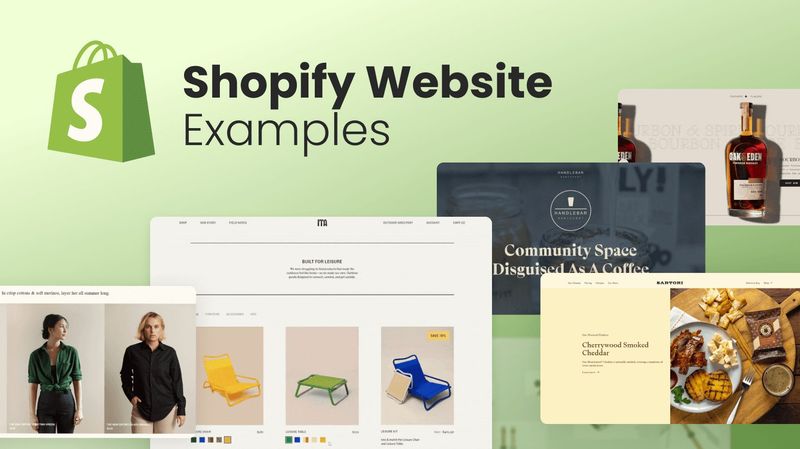
Shopify is well-known as a powerful platform for sellers who love customizing their online stores. Unlike marketplaces like Etsy or Amazon, merchants will have total rights to customize their branding, customer experience, and marketing. In order to optimize your e-commerce website on this platform, you can integrate with many apps, including both store design and fulfillment providers.
Pros
- You will have complete control over every aspect of your store. In this way, you can freely invent creative designs for your brand, from the layout, and product recommendations, to the checkout process which offers full control over your brand identity.
- Seamless integrations: Shopify allows sellers to easily connect with a wide range of apps, including POD services and robust customization options.
- Scalable growth - Shopify can support businesses of all sizes, even when you run a small business and easily scale as your store grows.
Cons
- Monthly subscription fees - Shopify pricing starts at $29 per month. And you have to pay additional costs when using further apps and premium themes.
- Traffic generation is your responsibility. Unlike marketplaces such as Etsy, and Amazon, sellers need to drive traffic through marketing efforts like ads, SEO, or social media.
- The learning curve for beginners: Although the interface of Shopify is estimated to be user-friendly, merchants still have basic technical knowledge of how to design their own site and manage stores.
- Payment processing fees: In addition to Shopify's subscription fees, you'll pay transaction fee
4- eBay
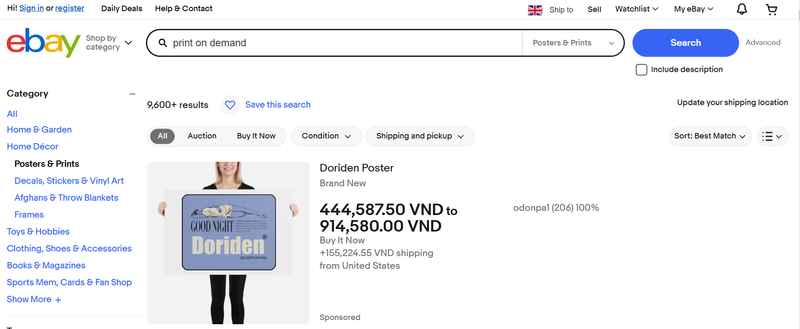
eBay is also known as a global marketplace where shoppers can find everything from collectibles to custom products. For print-on-demand sellers, this is appreciated as a potential market to promote one-of-a-kind items to more audiences.
Pros
- Huge number of customers: When launching your print-on-demand products on eBay, you'll have the chance to access millions of active buyers from all over the world.
- Flexible selling options: One of the most outstanding options on this platform is that sellers can set fixed prices or allow buyers to bid in auctions.
- Test products: Because the listing options on eBay are low-cost compared with other platforms, you can take consideration to test new POD designs on this.
Cons:
- Limited branding: Similar to Etsy and Amazon, sellers have little chance to establish their brand identity.
- Competitive marketplace: Despite a huge number of customers on this platform, sellers have to face the challenge of being outstanding on the highly competitive platform.
- Fast-shipping demand: Like almost all e-commerce platforms, shoppers also expect to receive quick delivery soon. This will be a big challenge for merchants when they run businesses on eBay
5- TikTok Shop
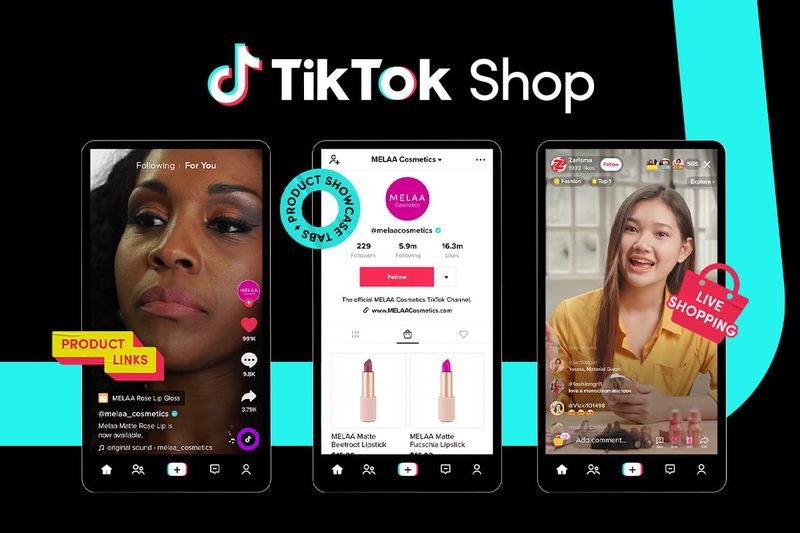
TikTok Shop is an e-commerce feature integrated with the TikTok app, allowing creators and merchants to engage audiences and sell directly on this platform. Despite a new marketplace with print-on-demand merchants, this is still recognized as a gold mine to help sellers skyrocket revenue. In particular, creators and merchants can utilize viral trends of short and entertaining videos to boost visibility and sales.
Pros:
- Massive user: For many recent years, TikTok has been evaluated as the potential platform that attracts millions of active users. Therefore, when selling on this platform, you can utilize a huge number of customers.
- Engaging content format: Short videos allow you to easily highlight the outstanding features of your products. Thanks to this, you can boost the interest and engagement of audiences.
- Integrate shopping experience: One of the biggest advantages of this platform is shopping experience integration. Audiences can make purchases right after engaging in short videos.
Cons:
- It's hard for merchants to access specific niches because TikTok's audiences are young and they might not align with product niches.
- Fees and commissions: On this platform, sellers also suffer certain charge fees for each sale, which can affect your profit margin.
- Short product lifecycle: The content trend on this platform can be viral so quickly and it might fade after a short time. And the content to promote your products is not an exception.
6- RedBubble
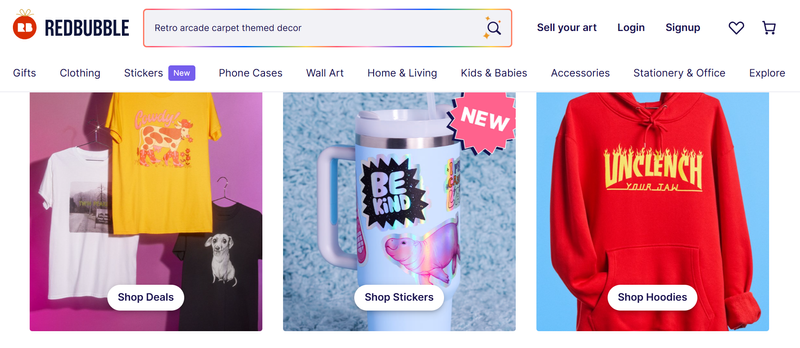
Redbubble is a print-on-demand marketplace where artists and creators can upload their designs to sell a wide variety of products. This platform is an ideal choice for sellers looking to reach shoppers who value unique, creative, and often personalized items. Additionally, Redbubble specializes in clothing and accessories, making it an excellent option for artists focusing on wearable art.
Pros:
- High-quality target audiences: Redbuble is made for artists and creators and the target customers are also those who love creative and personalized designs.
- Various product types: Merchants can choose different products, from apparel, and accessories to home decor items.
- No upfront costs: The biggest advantage of Redbubble is no listing fee which merchants hardly find on other marketplaces. You only have to pay a commission when a sale is made.
Cons:
- Competitive marketplace because sellers here are almost all artists and their designs are also innovative
- Redubble sets fixed base prices for products, which can reduce sellers' profit margins.
- Similarly to Etsy and Amazon, sellers also hardly build a unique identity for their stores because Redbubble tends to emphasize their brand over individual shops.
7- Society6
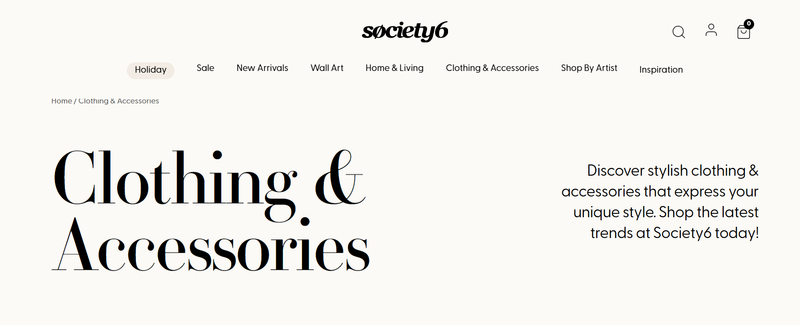
Similar to Redbubble, Society6 is designed for artists and designers to showcase their work. Shoppers on this platform tend to appreciate unique and personalized designs. Unlike Redbubble, however, Society6 offers a wider range of product types for merchants to apply their designs, including apparel, accessories, and home decor.
Pros
- Wide range of high-quality products: Compared to Redbubble, sellers can access a broader variety of product types. Additionally, the platform is designed with an artist-focused approach, ensuring that its top-notch printing techniques showcase artists' designs in the best possible quality.
- Customizable pricing: Artists can flexibly set prices for each product in their store. Therefore, they can control over their earnings.
- Global customers: This marketplace is also an ideal place where sellers can access a huge number of potential shoppers who are seeking artistic and custom products.
Cons
- Similar to Redbubble, Society6 is also a crowded place with many artists. Therefore, it's quite hard for POD merchants, especially newbies to stand out.
- Artistic designs preferred: the platform focuses on artistic and premium designs, so commercial designs may not perform well.
- Limited marketing control: Sellers have little control over advertising or SEO, relying on the platform’s built-in audience for visibility.
Conclusion
Selecting the best platform for print-on-demand products is one of the key factors to reaching your target audience and growing your business. Each platform, from Etsy and Amazon to Shopify and TikTok Shop, offers unique benefits and challenges.
Consider your niche, audience, and goals before choosing the platforms to run your business. If possible, don’t hesitate to diversify across multiple platforms to maximize your reach. With the right strategy, you can showcase your creativity, connect with the right customers, and turn your designs into a successful venture.







